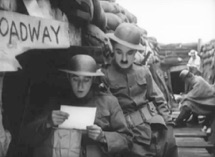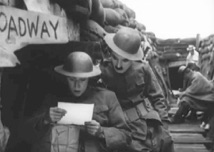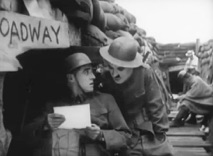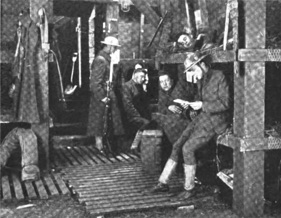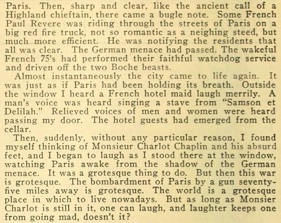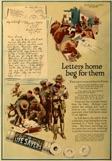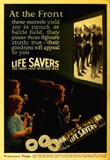Shoulder Arms 1914 1919 next previous
Shoulder Arms Clippings 26/246
Moving Picture World, New York, June 1, 1918.
Shoulder Arms Scenes
& Letters home beg for them (...)
They crave sweets, our boys in France.
,Remember those little Pep-o-mint Life Savers with the hole
in the middle? Well, send some along.‘“ (...)
„PEP-O-MINT
LIFE SAVERS“
(...) Photoplay, July and Aug. 1918
& At the Front
these morsels yield joy in trench or battle field,
they please these fighters sturdy,
true – their goodness will appeal to you
Life Savers
The Candy Mint With The Hole
(...) Photoplay, March 1918
& „THE SPIRIT OF THE RED CROSS“
Red Cross Picture Produced by Paramount
(...) Dramatic Mirror, April 13, 1918
„Laughter keeps one from going mad, doesn‘t it?“
Editorial content. „Chaplin Grotesqueries Fit in War Zone
And Now Dramatic Editor Cannot Think
of Comedian‘s Feet Without Also Recalling Raiders
and Exploding Shells.
Edwin Carty Ranck, in Brooklyn Eagle.
One doesn‘t usually associate Charlie Chaplin with
air raids, but in the future I shall never see the
eccentric movie actor fall over his own feet without thinking
of German raiding airplanes, exploding shells and
men and women burrowing their way into subway entrances
like rabbits entering warrens.
The second night after I landed in Paris I went to a funny
little movie house called the Cine Opera on the Boulevard
des Capucines, where the best seats are the worst and the worst
seats the best. By that I mean that they charge you more
the nearer you are to the screen and much less when are seated
ten rows back, which are, after all, the best seats for
movie fans. The cheapest seats in the Cine Opera were two
francs seventy-five centimes, which approximates fifty
cents in our money. The best seats are five francs; about
a dollar.
Bessie Barriscale was there in a clever Irish comedy
with French captions, which was, to an American,
a rather amusing incongruity. They flashed on the screen
the message of General Pershing, offering all of his
available resources to France. This brought forth a storm
of applause, the first spontaneous applause of the
evening, by the way. Then American boys were shown
at the front and there was more applause. They love
Americans, do these warm-hearted French people.
Then there was a prolonged shout of merriment and the
cause was soon apparent. There walked out upon the
screen, queer feet and all, Monsieur Charlot. That‘s what
they call him over here. They don‘t know anything
about the Chaplin part of his name. But the French people
adore Monsieur Charlot.
It was an outrageously funny Chaplin picture. Charie
had returned home intoxicated and couldn‘t get
upstairs to save his life. he also had weird experiences
with tiger rugs and bear rugs and a clock, the
pendulum of which had a queer way of getting out of the
clock case and striking Charlie on the nose. You
have probably seen the picture. It was played in New
York last winter.
Well, the French audience simply ,ate it up´, as we would
say in America. They laughed! They shrieked! They
roared with mirth. Every failure of Charlie‘s to get upstairs
was greeted with hysterical gaiety. There was a large
sprinkling of American officers in the audience and they had
as much fun as the French people, whose mirth was
contagious. Even if you didn‘t care at all for the Charlie Chaplin
brand of humor you would have had the time of your
life just watching those Frenchmen laugh, while seventy
miles away a German gun, facetiously dubbed ,Big
Bertha,‘ was sending shells into Paris at regular intervals.
At last it was all over. Charlie Chaplin finally
succeeded in getting into his moving bed, and the last laugh
vanished into air. Stepping outside into the April night
the contrast with the lighted movie house was uncanny. Paris
was a phantom city, dark and mysterious. Here and
there greenish lamps shone like queer, Poe-like worms,
and automobiles, sans lights, sans horns, sans
everything except motive power and chauffeurs, crept
along silently. In doorways pedestrians crouched,
looking up expectantly.
We were talking of Charlie Chaplin when it happened.
As if it had all been prearranged there came three
shots from a French ,75‘ and then the hoarse shriek of a
steam siren. Two venturesome Boche airplanes had
evaded the overhead region of Paris.
Out in the open square, in front of the silent and massive
French Opera House, men and women were staring
up into the air. Others were crowding into the subway station
at this point, the mouth of which was marked with a
greenish light ,Refuge.‘ We looked up, and while we couldn‘t
see much of the aerial combat; we saw the spraying light
of exploding shells and the peculiar deadened concussion of
the anti-aircraft guns as they poured a steady stream
of projectiles at the two Boche beasts.
It was about 10:15 when the firing began. I lingered
around for a while and then went back to my hotel,
where I found that all of the guests had taken refuge in the
cellar. i stood at the window of my room for some time,
looking out over the darkened city and seeing at intervals the
spray of an exploding shell falling in the darkness like
fragments of a Fourth of July skyrocket. The deadened din
of the anti-aircraft guns was continuous.
Then, suddenly the clamor ceased. It was then twenty
minutes to eleven. Suddenly a dead silence descended
upon Paris. Then, sharp and clear, like the ancient call of a
Highland chieftain, there came a bugle note. Some
French Paul Revere was riding through the streets of Paris
on a big red fire truck, not so romantic as a neighing
steed, but much more efficient. He was notifying the residents
that all was clear. The German menace had passed.
The wakeful French 75‘s had performed their faithful watchdog
service and driven off the two Boche beasts.
Almost instantly the city came to life again. It was just
as if Paris had been holding its breath. Outside the
window I heard a French hotel maid laugh merrily. A man‘s
voice was heard singing a stave from Samson et
Delilah. Relieved voices of men and women were heard
passing my door. The hotel guests had emerged
from the cellar.
Then, suddenly, without any particular reason, I found
myself thinking of Monsieur Charlot Chaplin and his
absurd feet, and I began to laugh as I stood there at the
window, watching Paris awake from the shadow of
the German menace. It was a grotesque thing to do. But then
this war is grotesque. The bombardment of Paris by
a gun seventy-five miles away is grotesque. The world is
a grotesque place in which to live nowadays. But as
long as Monsieur Charlot is still in it, one can laugh, and
laughter keeps one from going mad, doesn‘t it?“
Edwin Carty Ranck sees Chaplin in One A. M.
in the Ciné Opéra in Paris. His report is first published
in Brooklyn Daily Eagle, New York, May 12, 1918.
Redaktioneller Inhalt
Shoulder Arms 1914 1919 next previous

